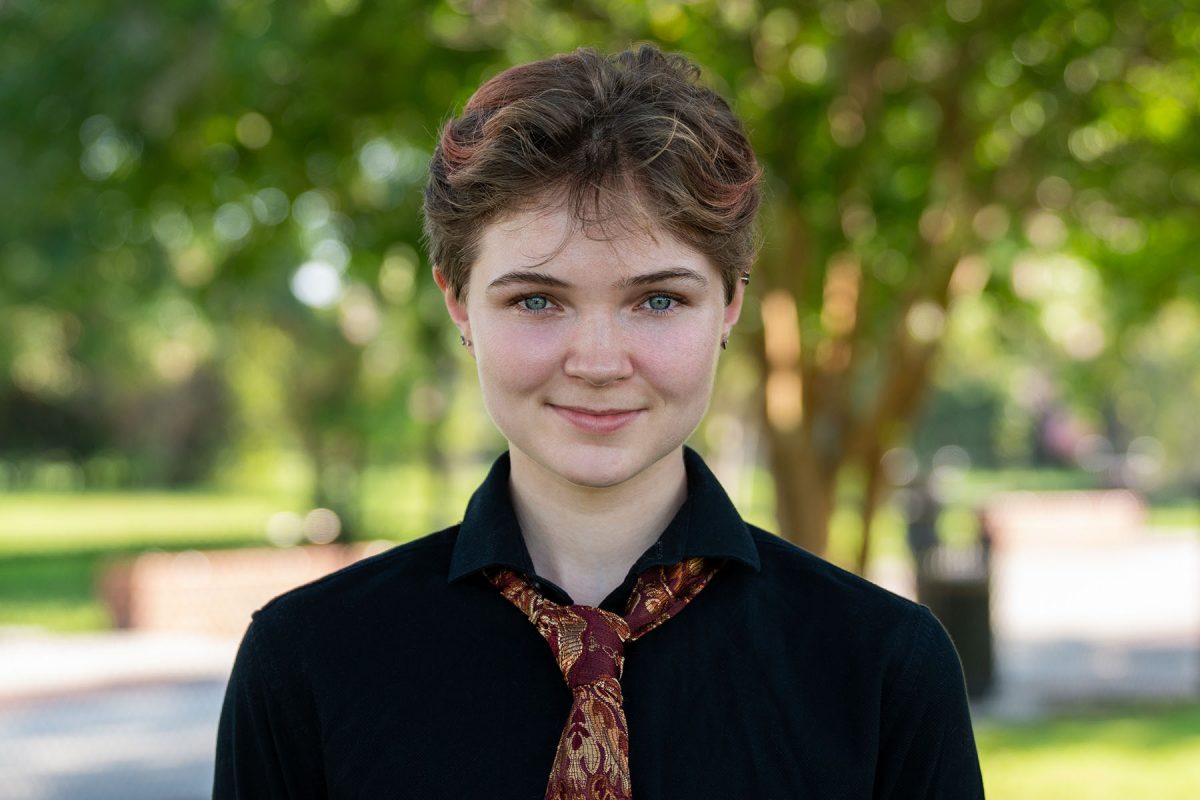
“My experiences at FSU have shaped my future in academia, shown me the importance of teamwork and grown my passion for research.”
Fast Facts
- Hobby Enthusiast: Likes to run, bake, knit and create art
- Favorite FSU course: World Languages
- Pets: Has a cat named Hypotenuse (Hippo for short)
- Volunteer: Worked at the FSU Museum of Fine Arts
- Hard worker: Has made the Dean’s and President’s List every semester
Riley Galpin is a mathematics and computer science double major who was drawn to Florida State University for its renowned undergraduate research programs and work opportunities.
While at FSU, Galpin participated in the Undergraduate Research Opportunity Program (UROP), researching the use of artificial intelligence (AI) in academic writing. Galpin has presented research findings at the Department of Modern Languages and Linguistics Open House, the Undergraduate Research Symposium and the 2025 Florida Artificial Intelligence Research Society (FLAIRS) Conference and intends to use his research to spread awareness about AI’s influence in academia and its ethical use.
Galpin also enjoys sharing his art with the FSU community, hoping to promote awareness about art’s ability to connect people from different backgrounds. His art has appeared on the cover of the Kudzu Review and in the Interlocking Art Gala.
Why did you choose to attend Florida State University?
I chose Florida State University because of its focus on research and opportunities for undergraduate involvement. I was excited about the opportunities through programs like the Undergraduate Research Opportunity Program and InternFSU. These programs have allowed me to develop research and leadership skills in real-world settings. I wanted to pursue research during and after my undergraduate degree, so FSU was the perfect choice.
What academic achievement are you most proud of?
Through UROP, I investigated the effects AI has on human language and how it affects writing styles in academia with Tom Juzek, an assistant professor of computational linguistics in the Department of Modern Languages and Linguistics. We found that the mainstream use of large language models in scientific abstracts may change the structure of how abstracts are written. Our research discusses AI’s effect on human language and how it affects writing styles in academia.
I presented my research at the Department of Modern Languages and Linguistics Open House, the Undergraduate Research Symposium and the 2025 Florida Artificial Intelligence Research Society (FLAIRS) Conference. I co-reviewed a paper in computational linguistics for Nature, the world’s leading multidisciplinary science journal. These experiences at FSU have shaped my future in academia, shown me the importance of teamwork and grown my passion for research.
How have you connected with the FSU community?
I’ve worked to foster communication and connection between students by bringing art into FSU’s campus. My art was featured on the cover of Issue 71 of the Kudzu Review, FSU’s undergraduate literary magazine, and showcased at the 2024 and 2025 Interlocking Art Gala, where I received a College of Fine Arts scholarship. I aim to create pieces that highlight the importance of identity and community. I believe art is a catalyst for change and can bring people together.
How do your academic achievements serve the FSU community?
My research has sparked conversations and new ideas about the effects of AI on language and its ethical use. This research on AI’s impact on scientific language has brought attention to how emerging technologies shape how we communicate in academic spaces.
My art has helped connect different fields and communities and encourages students to think about identity, resilience and how we relate to each other. By bringing art into academic spaces, I hope to make FSU’s campus more inclusive.



